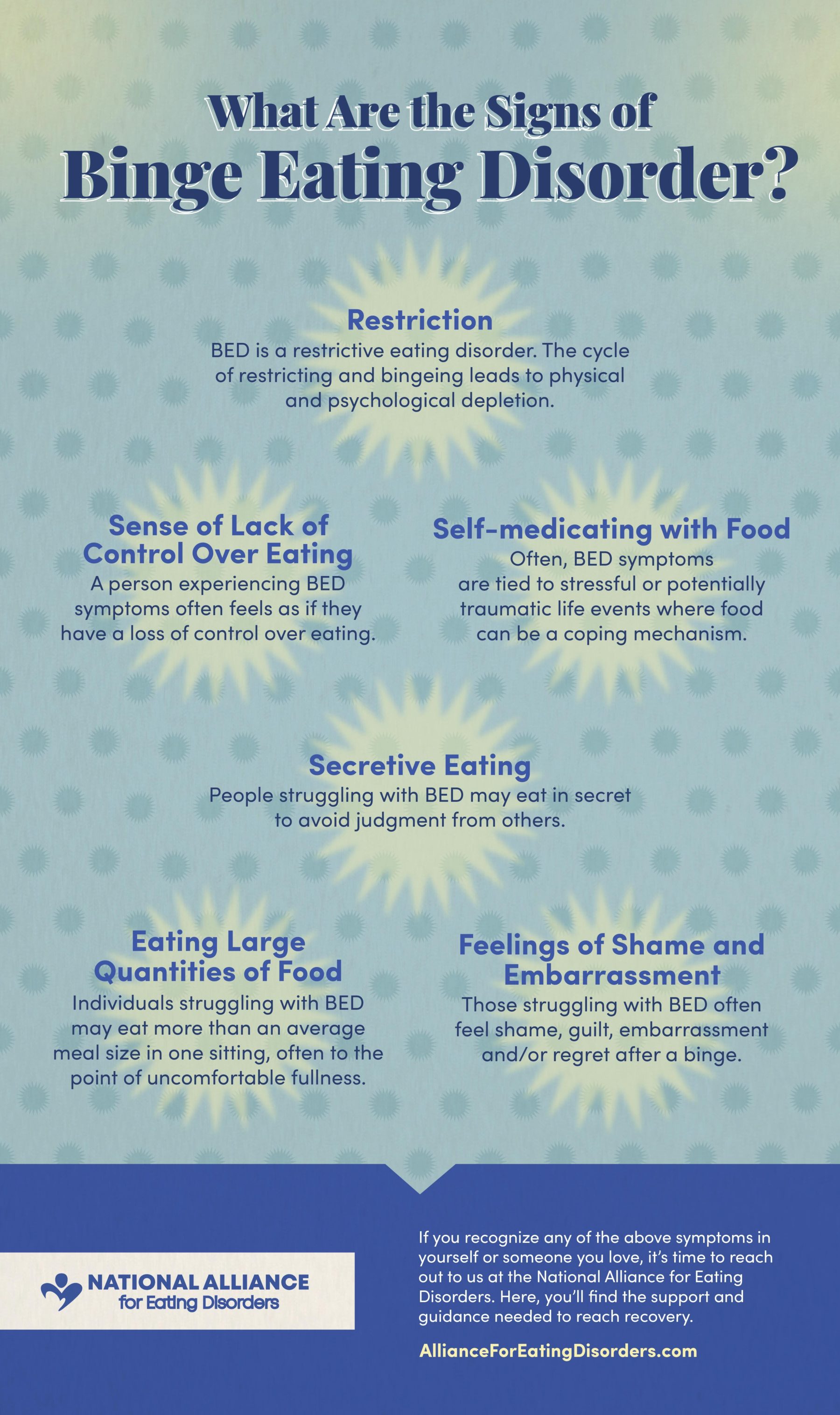What Is a Binge Eating Disorder?
With Binge Eating Disorder (BED), people experience recurring episodes of overeating that happen in a rapid manner and short timeframe. These episodes usually occur when they are not hungry and can extend past the point of a person reaching extreme fullness. People who struggle with this disorder may feel as if they have no control over their eating habits during an episode, where they can’t stop eating, can’t decide what to eat, or can’t determine how much they should be eating.
If you are struggling with Binge Eating Disorder, it is common for your binge eating episodes to be marked by significant distress followed by feelings of shame, guilt, and depression. These episodes happen, on average, at least once a week for three months or longer. Unlike other forms of eating disorders, people who have Binge Eating Disorder do not usually use inappropriate or unhealthy weight control tactics such as fasting or purging to counteract their binges.
Individuals with Binge Eating Disorder may live in higher weight bodies, however, anyone at any weight may struggle with the disorder. For those at higher weights, cultural weight stigma and bullying experiences may play a significant role in the development of Binge Eating Disorder, as well as co-occurring mood disorders and addictions.
An estimated 3.5% of women, 2% of men, and 30% to 40% of those seeking weight loss treatments can be clinically diagnosed with Binge Eating Disorder. BED is the most common eating disorder among U.S. adults and affects three times the number of those diagnosed with Anorexia Nervosa and Bulimia Nervosa combined.
If you are struggling with Binge Eating Disorder it is important to know that you are not alone. The Alliance is here to support you. Our team of experienced clinicians is uniquely trained to seek out and connect you with the necessary resources. Connect with us at findEDhelp.com to find eating disorder treatment options near you today, or continue reading to discover more about Binge Eating Disorder.

Signs & Symptoms of Binge Eating Disorder
Binge Eating Disorder can cause chronic health issues. Recognizing the signs of someone experiencing Binge Eating Disorder is extremely important in mitigating these risks. However, because of the secretive nature of the disorder, this can be difficult. Therefore, it’s important to understand all of the warning signs and symptoms associated with Binge Eating Disorder. While it is not a comprehensive list, the following symptoms are some of the most common among those struggling with BED:
- Eating large quantities of food
- Sense of lack of control over eating
- Eating until uncomfortably/painfully full
- Weight gain/fluctuations
- Feelings of shame, guilt, embarrassment, and disgust
- Self-medicating with food
- Eating alone/secretive eating
- Hiding food
- High levels of anxiety and/or depression
- Low self-esteem
- Distorted Body Image
- Lack of compensatory behaviors
If you or a loved one is experiencing any of the above symptoms, we recommend seeking treatment from a specialized professional. The Alliance is here to help. Visit our national, interactive database to find eating disorder treatment options near you today or call our therapist-staffed helpline at 866-662-1235. For a complete guide to DSM-5 Diagnosis Criteria for Binge Eating Disorder, visit the NCBI Website.
Dangers & Side Effects of Binge Eating Disorder
Binge Eating Disorder can cause a number of serious physical, emotional and social health complications. That’s why early intervention is extremely important. The following are just some of the dangers of BED:
- Type II Diabetes
- Osteoarthritis
- Lipid abnormalities (Including increased cholesterol)
- Increased blood pressure
- PCOS (Polycystic Ovary Syndrome)
- Chronic kidney problems
- Gastrointestinal problems
- Heart disease
- Certain cancers
- Gallbladder disease
- Joint and muscle pain
- Sleep apnea
It is extremely important to seek treatment if you or a loved one is experiencing any of the above side effects. The Alliance is here to help. Connect with us at findEDhelp.com or call our therapist-staffed helpline (866.662.1235) to find eating disorder treatment options near you today.
Binge Eating Disorder Diagnosis & Treatment
If you or a loved one is struggling with Binge Eating Disorder, you don’t have to go through this alone. The Alliance is here to help. Visit our national, interactive database to find eating disorder treatment options near you today or call our therapist-staffed helpline at 866-662-1235. Learn more about members of an eating disorder treatment team here, and discover recovery programs, services and support groups with The Alliance here. Help is available and recovery is possible.
Binge Eating Disorder and Loved Ones
If someone you love is struggling with Binge Eating Disorder, it can be a scary and difficult time for everyone involved. If your loved one is displaying any of the signs and symptoms mentioned above, it’s important to seek help. Early detection and intervention may increase the likelihood of recovery. It is also important that you, the family and friends of someone experiencing an eating disorder, get help and support for yourselves. Please consider attending family therapy and/or a family and friends support group. The Alliance is here to support you, too. Visit our page for loved ones to find out more about helping a loved one through an eating disorder, or sign up for our virtual friends and family support group here.
Featured Posts
March 28, 2024
Breaking the Stigma: Understanding Binge Eating Disorder
READ MORE
November 30, 2022
Binge Eating Disorder and the Holiday Season
READ MORE
Find Treatment Today
Recovery is possible, and we are here to help connect you with the resources to get there.
